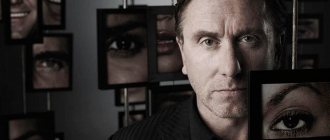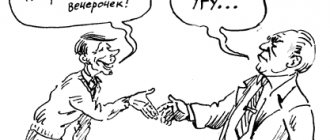Former CIA agent Jason Hanson, in his book “Protect Yourself Using the Secret Service Method,” talks about what spy techniques can be applied in everyday life. For example, how to learn to recognize a lie. These tools will help you when you want to find out the truth and expose liars, thieves, cheaters and hypocrites.
Before you try to spot a liar, establish a reference line. You need to know what is normal for a person and what is not. Let's say you decide that a certain lady scratched your car in the parking lot. You ask her a question and she starts showing signs of being a liar, like being super indignant. And you decide: “Exactly, it’s her!” But it is quite possible that the lady herself is very nervous and restless and always behaves this way.
You need to find out how a person reacts in a calm state, and only then apply the techniques described below.
Indirect answer
The first sign of lying is avoiding a direct answer to a question. Let's say you ask: “Did you steal the computer from the office?” - and you hear in response: “How could you even suspect me? I just got back from sick leave and I can’t even lift my wallet, let alone take out an entire computer.” A liar may also begin to say that he is the most respectable person in the world, or the eldest in the building, or was a prefect at the university, or is friends with the local police officer.
An honest person will not list all the reasons why he can be trusted, but will simply answer the question.
Cognitive approach: methods and results
All of the above methods for detecting lies in conversation were tested on volunteers. 1781 people took part in the experiment. According to the results, all participants, using a cognitive approach, were able to determine with an accuracy of up to 60% whether their interlocutor was lying or telling the truth.
Previously, studies showed that only 54% of people could accurately detect a lie.
But it is worth taking into account that some participants in the experiment knew other signs of lying besides those studied. Therefore, the results should not be taken to the nearest percentage. However, the cognitive approach increases the accuracy of the result by 25% and helps to structure the conversation competently.
On someone else’s misfortune: the purchase procedure and other nuances of “bankrupt” housing
Prestige, profitability: is it worth opening a barbershop and what are its features?
Put Ethics First: What to Do When You Have a Very Flirty Coworker
Legs
Many people naively think that the easiest way to recognize a liar is by his face, but that was not the case! A person’s legs provide much more information. Surely you have experienced such situations. You sit next to a person and ask him a provocative question. In response to this, he begins to twitch his legs. This most likely means he is lying.
By the way, do not forget about the starting point in all cases. There are people who almost always twitch their legs when talking.
Our legs give us away very often. By the direction in which the sole is directed, you can find out where a person wants to go. If you are talking to a person and their feet are pointing towards the door, then it is likely that they want to leave.
Customs officers are also taught to watch their feet. If during a conversation with an employee the legs are pointed at him, then the person has nothing to hide. And if the feet are facing the exit, then the customs officer may suspect that something is dirty.
Movie The Man Who Lies
Czech Republic (judging by the name in the pharmacy), World War II (judging by the Nazi soldiers running through the forest and streets). It is these same soldiers who are chasing a man (Jean-Louis Trintignant) dressed in a classic suit through the forest. In the end, the hero is overtaken and killed. But, this is a film by Alain Robbe-Grillet, so reality and memory meet at great speed and now we see Boris Varis, as this very man is called, on the street of the town. He is a close friend of one of the heroes of the Resistance movement, Jean Rabin, who recently allegedly died. No one knows him and no one really believes him, although he tries to tell everyone how he saved the hero. Then he goes to a remote castle, where three beautiful girls live - Raben's wife, his sister and their maid. He tells them his stories and they seem to believe him so much that he stays in their house and even manages to sleep with some of them. However, the viewer can understand from a series of incoherent flashbacks that Varys is not a member of the Resistance. However, with this, too, it is not entirely clear who Varys really is, and who Raben was.
Like many of Robbe-Grillet's films, this one is divorced from geographical and historical moorings. On the one hand, it seems that “Last Year in Marienbad” tells the story of two people meeting in Marianske Lazne, that “Eden and After” takes place in a Parisian cafe and an Algerian village, that “Trans European Express” rushes across the boundaries of geography. All this is true in a sense, but the films would not have lost anything if Robbe-Grillet had changed the geographical context. The same applies to this film, which only at first glance looks like a military-historical film, but in fact is another metaphorical story, another study of the falsity of human memory, the relativity of perception, another cast of images, ideas, a collective mind capable of creating such miracles that you cannot see in reality. It is even difficult to determine whether the war has already ended or not, and which of the scenes shown belong to the realm of memories.
It is difficult to say which of what is shown is objective truth; there is no objectivity here as such in principle, and the viewer is placed in exactly the same position as the rest of the film participants. Even a little more complex, if you look at it, because the viewer has no idea what Jean Rabin looks like. In other words, Robbe-Grillet creates the most complex world in which reality is not only intertwined inextricably with memories, but, in fact, becomes them, and this, in turn, is complicated by the fact that memories can be false. Therefore, the slightest attempt to analyze the sequence or even simply build a logical chain of scenes seen in the mind of a normal person is doomed to failure. But Robbe-Grillet's work is not at all intended for such straightforward analyses. Here complex brain research and scientific work are already in use, the field of which is located not only and not so much in cinema, but in psychoanalysis and even sometimes in psychotherapy.
Of course, someone may complain that the film does not look like a film, some kind of experimental confusion, modern kitsch instead of art. In this dissatisfaction, of course, in addition to a certain narrow-mindedness and closed-mindedness, which always prevents us from perceiving something outside the usual coordinate system, there will also be a grain of truth. Yes, Robbe-Grillet deliberately denies many of the artistic features characteristic of canonical narrative cinema. This is no longer an ordinary film, it is no longer even a film at all. It is a kind of abstraction that involves to some extent the very material that makes up the movie, but is intelligent enough to look inward, analyze, change the order. This is more of a scientific work or even a laboratory experiment, which may not have any visible emotional benefit for the average person, but from the point of view of the development of the cinema institute itself, it is even an important point in history and evolution. People don’t go to the cinema to see such films; such films are sources of quotes for subsequent generations. And it is at least risky to evaluate such works from the position of a simple viewer.
Too sincere look
Many people think that if a person begins to lower his eyes to the floor, then he is lying. This is wrong. A person may have a dozen reasons to look down. Embarrassment, for example.
Imagine: your boss calls you and asks where the reports went. You don't know where they went. You lower your eyes. The situation itself is such that this is a normal reaction for you. Especially considering that your boss is annoying you, and you are a subordinate.
On the contrary, a look that is too honest and sincere can give away a liar. If a person looks you straight in the eyes, too directly and sincerely, this may mean that he is lying.
Unexpected questions
Of course, a person can be well prepared for a lie and think through his answers in advance. Therefore, deliberate lies are quite difficult to detect. However, if a person has prepared well and thought through the answers, then it is worth asking completely unexpected questions. He who tells the truth will find his bearings and consistently move the story forward. Whoever lies will not be able to tie ends meet.
Lying and cheating: what's the difference?
People often lie and deceive for a specific purpose - for example, to sell a product or to avoid negative consequences. But lying implies a certain disrespect towards a person. In the case of deception, the attitude towards the object of fraud can be neutral: for example, a person simply needs to receive financial benefit. That's why he deceives everyone. But at the same time, he does not harbor hatred or disdain for anyone.
Moreover, deception involves a selfish goal. And you can lie solely for the sake of self-preservation. Example:
- I had to lie that I participated in the school Olympiad. This is because if my father found out that I performed at a rock concert, he would rip my head off.
- Can not you see? He's deceiving you! You can buy a phone with features like this one for 5 times cheaper. This model is “a hundred years old”! Don’t even think about transferring money to him!
- Sorry, I lied to you. In fact, I am married and have a child. No, you didn’t just lie to me - you deceived me for 2 months (an example of using two concepts at once).
- Couldn't you just say right away that you couldn't help me? Why did you have to lie? I lost a lot of time because of you.
- Sorry, dad. I didn't mean to deceive you. But you would be horrified if you found out that your daughter was expelled from the Polytechnic and has been working as a model for 5 years now.
Lying is always a prolonged action. And deception can be short-term or even isolated. Example:
- Ivan had to lie that he was 18 years old in order to be sold alcohol in the store.
- For 10 years now, Tamara has been deceiving her husband that she cannot get pregnant. Although, in fact, she was simply afraid of ruining her figure - so she used all sorts of “tricks” to avoid getting into an “interesting position.” Like many men, Artem didn’t even know about it. He thought his wife had health problems.
As you can see, the difference between the concepts of “lying” and “deceiving” is clearly visible in the examples. It's simple, you just need to remember.
The difference between deception and lying: what is the difference between these concepts?
As in the case of lies, lying is a more critical, systematic concept. But deception can be isolated. Moreover, lies involve self-interest and, possibly, negative consequences. Deception can be one-time and even harmless. There is also a gradation of deception: self-deception, tactical deception, verbal deception, deception in the game, etc. This is the difference and difference between these concepts.
- My grandfather went to war at the age of 15. He had to give himself 3 years to be taken to the front - a single deception . So, after this incident, the protagonist’s grandfather could live a long life without ever lying to anyone again.
- Don't even think about going for an interview with this company. Their stories about high salaries and bonus systems are lies. In fact, instead, you will run around the city for days, offering everyone windows and doors from a low-quality manufacturer that no one needs. And people will swear and tell you to go to hell - all because they already know that these are scammers. And you may not get any money at all. It's all a lie .
- Of course, I fooled myself into thinking that I could sing. But when my uncle, a teacher at a music school, accidentally heard me, he said that not everything was lost - supposedly, I had a voice, but I needed to work a little on my hearing. Lies .
- I'm tired of your lies! Do you even tell the truth sometimes? This is a lie.
Below is some more interesting information. Read on.
Lie, deceive, tell lies: synonyms
To better know what the concepts of “lying”, “deceiving”, “telling a lie” , it is worth choosing synonyms for these words. Here are some of them:
- dissemble
- To hang noodles on one's ears
- To fool
- Fool
- Burn
- Fool
- Fool
- Cheat
- Outwit, etc.
Try to find other synonyms yourself. There are even more examples in quotes from literature. Read on.
Why do people constantly lie and deceive?
People constantly lie and deceive.
People are driven by the fear of receiving a fair punishment. He lies to protect himself. This continues into adulthood. For example, a husband can mask the consequences of drinking with friends in the garage, and a wife can hide the presence of a lover, lie about being late at a friend’s place or at work, etc. So why do people constantly lie and deceive?
One way or another, lies are used in several cases:
- A person is afraid of punishment and unpleasant consequences - and that is why he carefully hides and keeps silent about the truth. Plus, he comes up with “fantastic stories” to divert suspicion from himself.
- A person wants to get something (material component) - another reason for deception. The seller understands perfectly well that his product is not as ideal as the advertisement says. But he needs to sell this thing. That is why he will lie to the buyer and say that this is the best thing on earth that has no analogues. Of course, a person will later find out about the disadvantages. But not every buyer will return the item back and demand money. Many people read the characteristics on the Internet and negative reviews and give up - they say, it’s their own fault. I should have looked right away.
- The habit of lying - just as kleptomaniacs, even if they have money, cannot help but steal something from a store, so pathological liars cannot help but lie. They definitely need to distort the truth and invent non-existent facts.
One way or another, a person lies, lies, deceives solely because telling the truth in a given situation is unprofitable for him. The desire to improve one’s position is the motivator that forces one to “get confused in testimony,” shield oneself and deceive others.
Psychology of lies
A liar always understands that he is getting involved in a risky event. Subconsciously, we perceive lying as a crime. And although there is no criminal or administrative liability for everyday lies, the liar is haunted by the fear of exposure. Even if a person doesn’t give a damn about your opinion about him and your attitude towards him, he will in any case subconsciously do two things:
- Try to block the transmission of false information. This can be clearly seen in children's gestures: a child who is lying tries to cover his mouth with his hands.
- Communicate the liar's fear of discovery. A person begins to assess the consequences of exposure when it is inevitable or has already occurred. Until the lie is exposed, even complete impunity in the future will not relieve a person from the fear of being exposed as a lie.
A liar will try to hide his excitement under a mask of false emotions. But the problem is that anxiety has completely physiological forms in the form of increased heart rate, increased sweating, dry mouth - all this is difficult to hide. Another problem is that it is noticeable to others that the emotions are false. A liar can be revealed:
- eyes
- facial expressions
- voice
- speech
- gestures
Let's take a closer look at each point.











